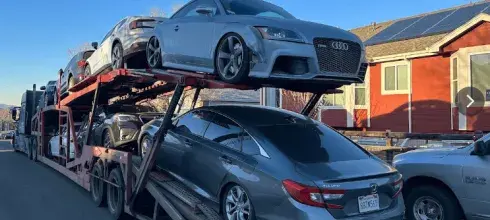
12 Ways Cold Weather Affects Your Car
Winter can be a challenging time to be driving your car. There’s often plenty of precipitation, extra hours of darkness, freezing temperatures, and icy roads. Knowing how the cold weather might affect your car helps you better prepare.
It might be a little late in the year to hand out advice for the cold weather, but read this post and then keep the information for future reference.
Dying car batteries
Car batteries don’t like the cold. The lower the temperature, the harder it is for the battery to give off enough charge to start the car’s engine.
A quick fix is to use jumper cables to get your car started and warm everything up, but it’s not much fun to do in the winter.
Old and weak batteries are more at risk of giving out on you when it gets cold. Get your battery tested before the winter arrives.
If temperatures regularly drop below freezing where you live, consider investing in a battery warmer.
Freezing engine fluids
When the temperature outside drops, the fluids in your car don’t like it. Fluids such as your car’s motor oil, transmission fluid, and antifreeze then tend to get thicker and slow moving. When this happens, it can make starting the engine and driving in general rather sluggish.
Thicker oil means the oil pump gas works harder than normal but you can swap to a lower-viscosity oil if you suspect your car is struggling.
It’s also important that your car’s transmission fluids are flowing effectively. When they’re not you’ll struggle to switch gears.
It might surprise you to learn that even antifreeze, or engine coolant, can freeze up in the winter. If this happens, your vehicle’s engine will be unable to maintain its optimum operating temperature. The frozen liquid might also crack and damage your radiator hoses.
Icy fuel lines
Gasoline generally doesn’t freeze when temperatures are above -40°F. However, should there be any condensation in a fuel line, this can cause serious problems.
Ice in your car’s fuel lines can inhibit the intake of fuel. This will make your car hard to start or give you a bumpy, sputtery ride.
A good way to avoid an icy fuel line is to keep the gas tank at least half full.
Decreased tire pressure
The air in your car tires expands in the heat and contracts when the temperatures drop. When it contracts, the tire pressure decreases which increases rolling resistance and affects handling and gas mileage.
Reduced tire grip
The rubber used in standard all-season tires and high-performance summer tires can harden and stiffen when the temperatures drop. This means the grip is reduced, even when the roads are clear. The reduced grip makes steering and braking more difficult.
The best solution is to swap summer tires for winter tires. These use special rubber compounds that stay sticky and soft even when temperatures are extremely cold. They are, by far, the safest cold-weather choice.
Rigid rubber components
Technically, synthetic rubber and rubber don’t freeze. However, they can get very rigid when the temperatures are cold. They lose their bendiness and become very brittle and more likely to break.
You might experience motor belts breaking, windshield wiper blades cracking, or tears along your door jambs.
Sluggish LCD screens
Does your car have any LCD screens? You generally find LCD screens on the information screen or radio. This type of screen tends to be less responsive in the winter because the liquid crystals slow down when cold.
Preventing cold LCDs is challenging unless you’re got a garage to park your car in. The best course of action is to wait for your car to heat up before hitting the sounds. If you’ve been having problems with chronically frozen doors, wipe down the gaskets with silicone spray. This will prevent them from freezing shut.
Freezing windshield wipers
Cold temperatures can cause your windshield wipers to freeze. This can be dangerous during times when visibility is important.
It might be frustrating to wait for your windshield to defrost in the morning, especially if you’re in a hurry to get the kids to school or get to work. However, if your windshield isn’t defrosted completely, you run the risk of damaging your windshield wipers.
One solution, if you know it’s going to get extremely cold overnight, is to tilt your windshield wipers up or take them off.
Windshield frozen on the inside
If the defrost function in your car isn’t working properly, it can be a serious safety issue when you drive your car. Your breath might condense and freeze on the inside of the windshield.
Antifreeze not living up to its name
If your car’s engine coolant is old or the ratio of coolant to water is not correct, it won’t be as effective at protecting your engine against the elements.
Snow snakes
This is a term for when older serpentine belts get extremely cold and either break because they’re worn or the cold has done them in. It might also occur because the belts are so frigid they don’t bend.
Problems for EVs
Cold weather can impact your EV's performance and efficiency. Low temperatures slow the battery chemistry and result in less energy for acceleration.
More energy is required to keep the battery at an efficient operating temperature. Extra energy is also needed to keep the car interior and you warm.
The extra pressure on the battery results in less efficient performance and you might not have as much range as during warmer weather. Car and Driver ran a Chevy Bolt EV in cold weather and compared it with a test done in almost ideal EV driving conditions and the result was a 19% drop in efficiency.
SGT Auto Transport is a car shipping company that ships cars across the country 365 days of the year. We don’t let winter weather hold things up and offer year-round auto transport services when you need them. If you want to know how much it might cost, get your quote today.
If you’ve got any questions, speak with our shipping advisors at (864) 546-5038 or use our Live Chat option.
FAQs
How do cars react to cold weather?
Several things can happen to your car when the weather turns cold. For example, fluids thicken, the car’s battery will have to work harder, and your car might be harder to start.
Does temperature affect the car?
Heat and cold can both affect how your car runs in a variety of different ways.
Why does my car struggle to start when the engine is cold?
When a car’s engine is cold, it affects the chemical process inside the battery and reduces its ability to hold a charge. In addition, the engine oil thickens which increases friction in the car’s starter motor, making it work harder.
Can cold weather cause transmission problems?
When it’s cold, the transmission fluid gets much thicker. This can affect shifting and potentially cause internal damage.
Does cold weather affect car suspension?
Low temperatures can cause springs to get brittle and hard, which affects control over body roll. The suspension’s rubber bushings also get harder in cold weather and lose some functionality. The suspension oil is also going to get cold when the temperatures drop which makes it flow less efficiently to the shock absorbers. The result is a decrease in the car’s suspension to absorb road energy. You’ll experience noticeably stiffer shocks when driving in cold weather.








